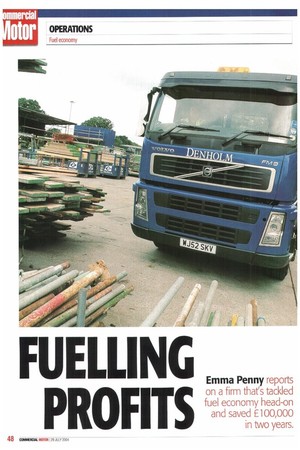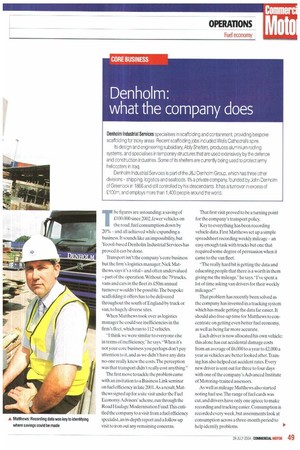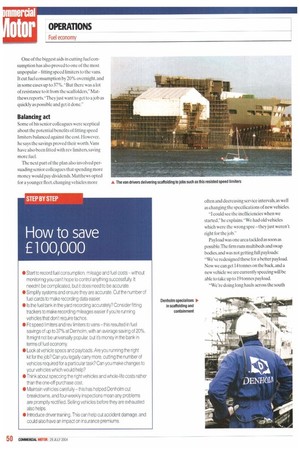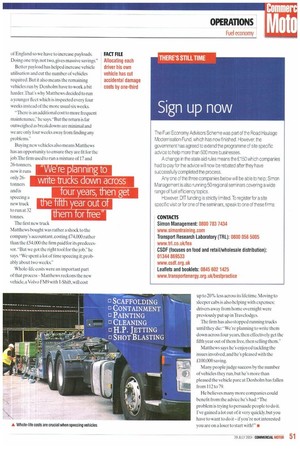FUELLING PROFITS
Page 48

Page 49

Page 50

Page 51

If you've noticed an error in this article please click here to report it so we can fix it.
Emma Penny reports on a firm that's tackled fuel economy head-on
and saved E 1 00,000
in two years.
The figures are astounding: a saving of £100.000 since 2002, fewer vehicles on the road, fuel consumption down by 20% — and all achieved while expanding a business. It sounds like an impossibility. but Yeovil-based Denhohn Industrial Services has proved it can be done.
Transport isn't the company's core business but the firm's logistics manager, Nick Matthews, says it's a vital— and often undervalued —part of the operation. Without the 79 trucks, vans and cars in the fleet its f..50m annual turnover wouldn't be possible. The bespoke scaffolding it offers has to be delivered throughout the south of England by truck or van, to hugely diverse sites.
When Matthews took over as logistics manager he could see inefficiencies in the firm's fleet, which ran to 112 vehicles.
"I think we were similar to everyone else in terms of inefficiency,he says."When it's not your core business you perhaps don't pay attention to it, and as we didn't have any data no-one really knew the costs.The perception was that transport didn't really cost anything."
The first move to tackle the problem came with an invitation to a Business Link seminar on fuel efficiency in late 2001.As a result, Matthews signed up for a site visit under the Fuel Economy Advisors' scheme, run through the Road Haulage Modernisation Fund.This entitled the company to a visit from a fuel efficiency specialist, an in-depth report and a follow-up visit to iron out any remaining concerns. That first visit proved to be a turning point for the company's transport policy.
Key to everything has been recording vehicle data. First Matthews set up a simple spreadsheet recording weekly mileage — an easy enough task with trucks but one that required some degree of persuasion when it came to the van fleet.
-The really hard bit is getting the data and educating people that there is a worth in them giving me the mileage," he says."I've spent a lot of time asking van drivers for their weekly mileages!"
That problem has recently been solved as the company has invested in a tracking system which has made getting the data far easier. It should also free-up time for Matthews to concentrate on getting even better fuel economy. as well as being far more accurate.
Each driver is now allocated his own vehicle: this alone has cut accidental damage costs from an average of £6,000 to a year to £2,000 a year as vehicles are better looked after.Training has also helped cut accident rates. Every new driver is sent out for three to four days with one of the company's Advanced Institute of Motoring-trained assessors.
As well as mileage Matthews also started noting fuel use.The range of fuel cards was cut, and drivers have only one apiece to make recording and tracking easier. Consumption is recorded every week, but assessments look at consumption across a three-month period to help identify problems. One of the biggest aids in cutting fuel consumption has also proved to one of the most unpopular fitting speed limiters to the vans. It cut fuel consumption by 20% overnight, and in some cases up to 37% ."But there was a lot of resistance to it from the scaffolders," Matthews reports."They just want to get to a job as quickly as possible and get it done,
Balancing act
Some of his senior colleagues were sceptical about the potential benefits of fitting speed limiters balanced against the cost. However, he says the savings proved their worth. Vans have also been fitted with rev limiters, saving more fuel.
The next part of the plan also involved persuading senior colleagues that spending more money would pay dividends. Matthews opted for a younger fleet, changing vehicles more often and decreasing service intervals, as well as changing the specifications of new vehicles.
could see the inefficiencies when we started," he explains. "We had old vehicles which were the wrong spec they just weren't right for the job."
Payload was one area tackled as soon as possible.The firm runs rnultibeds and swap bodies, and was not getting full payloads: "We've redesigned these for a better payload. Now we can get 14 tonnes on the back, and a new vehicle we are currently speccing will be able to take up to 19 tonnes payload.
"We're doing long hauls across the south of England so we have to increase payloads. Doing one trip, not two, gives massive savings."
Better payload has helped increase vehicle utilisation and cut the number of vehicles required. But it also means the remaining vehicles run by Denholm have to work a bit harder.lhat's why Matthews decided to run a younger fleet which is inspected every four weeks instead of the more usual six weeks.
"There is an additional cost to more frequent maintenance." he says.-But the return is far outweighed as breakdowns are minimal and we are only four weeks away from finding any problems.
The first new truck Matthews bought was rather a shock to the company's accountant, costing £74,000 rather than the £54,000 the firm paid for its predecessor."But we got the right tool for the job." he says."We spent a lot of time speccing it:probably about two weeks."
'Whole-life costs were an important part of that process —Matthews reckons the new vehicle, a Volvo FM9 with I-Shift, will cost up to 20% less across its lifetime. Moving to sleeper cabs is also helping with expenses; drivers away from home overnight were previously put up in Travelodges.
The firm has also stopped running trucks until they die: "We're planning to write them down across four years, then effectively get the fifth year out of them free, then selling them."
Matthews says he's enjoyed tackling the issues involved, and he's pleased with the /100,000 saving.
Many people judge success by the number of vehicles they run.but he's more than pleased the vehicle parc at Denholm has fallen from 112 to 79.
He believes many more companies could benefit from the advice he's had: "The problem is trying to persuade people to do it. I've gained a lot out of it very quickly but you have to want to do it— if you're not interested you are on a loser to start with!" •


















































































































































































